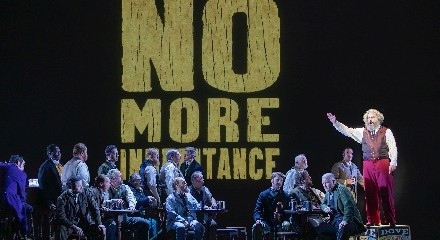14.03.2024

Essentially human qualities
Tam Dean Burn reviews Marx in London! by Jonathan Dove (director Stephen Barlow) Theatre Royal Glasgow, February 15-17, and Festival Theatre Edinburgh, February 22-24 - UK premieres
Karl Marx and his family lived in London for over 30 years, but Jonathan Dove’s comic opera concentrates on just one day in their life there - August 14 1871.
I am not sure why this date was chosen, but it was certainly one of the most intense periods of Marx’s life. His pamphlet on the lessons of the recent days of the Paris Commune, The civil war in France, had changed his life. As Francis Wheen describes in his Karl Marx biography, “After years of obscurity, Karl Marx suddenly woke up to find himself infamous.” Wheen quotes Marx’s letter to Ludwig Kugelmanm: “I have the honour to be at this moment the most calumniated and the most menaced man in London.”1
Wheen also relates that Marx’s doctor recommended he should ease his stress by taking a break: he and family members went off to Brighton for two weeks in August 1871, so maybe Dove chose August 14 to illustrate all the domestic difficulties the family had also faced up to that point.
Dove cites Wheen’s book and Jonathan Sperber’s Karl Marx: a nineteenth century life as the key texts that he drew from in creating the opera, whose first performance was in Bonn, where Marx had attended university in 1835. The director of the opera house there, Jürgen R Weber, was looking to commemorate Marx’s 200th anniversary in 2018 and provided Dove with the idea of a comic opera, exploring the Marx family misfortunes and chaos.
These were caused through continual poverty-stricken panic and only resolved by visits to the pawnbrokers, and cash received from Friedrich Engels. Indeed one of the funniest and most audacious moments in Scottish Opera’s production is Engels’ arrival on a penny-farthing wearing goggles and sprouting a pair of wings as the family’s ‘guardian angel’. He also later appears as a veritable knight in shining armour.
As I say, the opera had a world premier production in Bonn in 2018, but the Covid lockdown prevented it from coming to the UK at that time. So an entirely new production has been created and I can only imagine that we are very fortunate that this happened, as this is a brilliant and very funny tour de force in every aspect - from its slapstick and farce-facing direction injected by Dove’s long-time collaborator, Stephen Barlow, to the awe-inspiring stage set jointly produced by Yannis Thavoris and opera first-timer PJ McEvoy. This dazzlingly portrays a two-dimensional-appearing, yet-ever evolving, Victorian London, reminding me somewhat of Walt Disney’s film, Mary Poppins.
We are shown scenes of the move from the Marx residence at Maitland Park, Kentish Town, which is emptied of its furniture by bailiffs, and of its procession on a cart through the streets with Marx’s daughter, Eleanor (nicknamed ‘Tussi’), who is singing incredibly highly pitched notes to a young man she pretends is their new piano teacher (but is actually a gun-maker) in pursuit of knowledge about his origins. In true comic-opera style, we discover that Marx had an illegitimate child with their housekeeper, Helene. She spends much of the first half of the show warding off Karl’s advances, whilst beating him at chess, then consoling his wife, Jenny, whilst getting sozzled with her through the song ‘Another little drink’.
Alcohol also features at the Red Lion pub, where Karl wins an unlikely ‘commie karaoke’ competition with a bravura speech trouncing the invented Italian anarchist, ‘Giuseppe Melanzane’. With an impassioned plea for humanity to leave behind private property and inheritance and move to a socialist future (which I could hear produced quiet chortling behind me, but could not tell if this was Schadenfreude or not), Karl wins the suitcase of cash on offer. But, rather than use it to solve the family’s financial problems, he spends it all at once buying every revolutionary in the pub a round of drinks!
The other moment where politics usurps the farcical fray is at the end of the first act, when Marx is in his favourite British Museum reading room. Tired out by his efforts and plagued by carbuncles on his backside, which made writing difficult, he dozes off there - and the chorus emerges in his dream, with the refrain of “Soon, soon”, answering his call for revolution. Amongst the masses joining in that chorus we see a suffragette, a civil rights campaigner, a 1960s peacenik, a gay rights activist and a present-day nurse with a placard demanding a pay rise. Perhaps not quite a storming of the barricades, but a poignant evocation of the need for mass action nonetheless.
Dove has said that he wanted to explore the contradictory and essentially human qualities of Marx (without the ‘ists’ or the ‘ism’), but I do think his past work, producing many large-scale community operas, has given him the sense of the need for, and power of, collective culture. Dove is a unique figure in contemporary theatre practice. His most successful work so far is Flight - another unlikely comic opera about the true story of an Iranian refugee who lived in Charles de Gaulle Airport for 18 years!
I hope this wonderful Scottish Opera production moves beyond its February premieres in Glasgow and Edinburgh and finds its way home to London - with ticket prices within reach of all those interested in Marx (including its ‘ists’ and ‘ism’!), and who also appreciate what Dove says he always strives for - a good night out!
-
. F Wheen Karl Marx New York 2012, p395.↩︎
